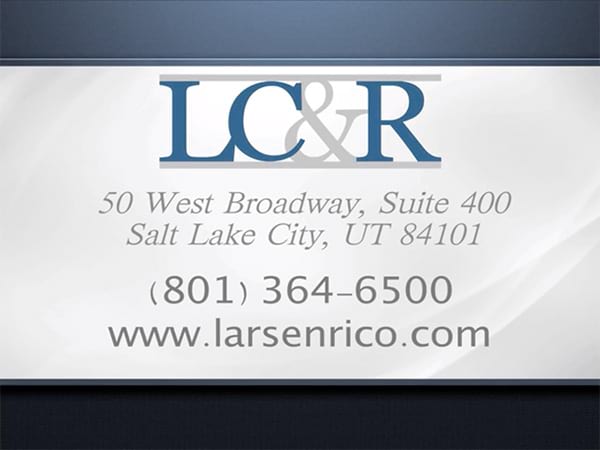Recent Blog Posts
The Wayback Machine (www.archive.org)
A company’s website may contain critical evidence, especially some version of a website published years prior to the filing of a lawsuit. Most websites change making the current version inadmissible to prove its content from years ago. When a witness viewed a website years before the lawsuit was filed, how do you prove what… Read More »
Utah’s Attorney Work-Product Privilege: The Basics & Sources
Elements[1] Three essential requirements for materials to be protected by the work product doctrine under Rule 26(b)(3) of the Utah Rules of Civil Procedure: 1. The material must consist of documents or tangible things, 2. Prepared in anticipation of litigation or for trial Applies in ADR and administrative actions 3. By or for another… Read More »
Authority from Other Jurisdictions Suggests That a Negligent Misrepresentation Claim is Subject to the Economic Loss Rule
Courts in other jurisdictions also hold that where tortious misrepresentations concern the quality and characteristics of the property being transferred by contract, the economic loss rule applies because the tortious representations are indistinguishable from the bargained for warranty provisions of the contract. A foundational case on the interaction of tortious misrepresentation claims and the… Read More »
Economic Loss Rule Applies Where There is an Absence of Independent Duty Coupled with Lack of Privity
Grynberg v. Questar Pipeline Co., 2003 UT 8, 70 P.3d 1 (applying Wyoming law), noted that whether the terms of the contract address the dispute is a threshold question. Id. at ¶ 53. Hafen v. Strebeck, 338 F.Supp.2d 1257 (D. Utah 2004), addressed the application of the economic loss rule to the situation where… Read More »
The Economic Loss Rule Does Not Bar Misrepresentation Claims Where There is a Special Relationship
Negligent misrepresentation claims seeking recovery of economic loss have been allowed where independent duties of care exist, such as where duties are created by a defendant’s professional obligations.[1] In both Hermansen (licensed real estate professional) and West (appraiser), the tortfeasors owed the tort victims independent duties of care due to their professional positions. Currently,… Read More »
Economic Loss Rule: Where an Entity Holds Itself out to the Public as Having Expertise
Mountain Bird, Inc. v. Goodrich Corp., 369 Fed. Appx. 940 (10th Cir. 2007)(applying Idaho law) addresses the second special relationship exception to the economic loss rule “where an entity holds itself out to the public as having expertise regarding a specialized function, and by so doing, knowingly induces reliance on its performance of that… Read More »
Statutes Do Not Create a Special Relationship Under the Economic Loss Rule
For the purpose of the application of the Economic Loss Rule, statutes generally do not create a special relationship. Statutory products liability law generally do not create an independent duty of care. See Simantob v. Mullican Flooring, L.P., 527 Fed. Appx. 799 (10th Cir. 2013). A violation of (i) the Truth in Lending Act;… Read More »
Primary Exception to the Economic Loss Rule: Special Relationships Creating an Independent Duty
There are at least two special relationship exceptions to the economic loss rule. A professional relationship is the first exception to the application of the economic loss rule. Generally speaking, professionals, who owe an independent duty to their client and non-contracting parties, cannot invoke the economic loss rule to bar their client’s tort claims. … Read More »
The Development of the Economic Loss Rule in Utah
Early Utah cases exploring the economic loss rule arose from claims centered upon construction and construction design issues. See, e.g., American Towers, 930 P.2d 1182 (barring under the economic loss rule a claim against an architect for negligent design and construction); SME Industries, 2001 UT 54, 28 P.3d 669 (barring a steel subcontractor’s negligence… Read More »
Definitions of “Economic Loss Rule” and “Other Property” Under Economic Loss Rule
“The economic loss rule prevents a party from claiming economic damages ‘in negligence absent physical property damage or bodily injury.’” Fennell v. Green, 2003 UT App 291, ¶ 13, 77 P.3d 339 (quoting SME Industries, Inc. v. Thompson, 2001 UT 54, ¶ 32, 28 P.3d 669 (additional quotations and citation omitted)). Economic loss is… Read More »


